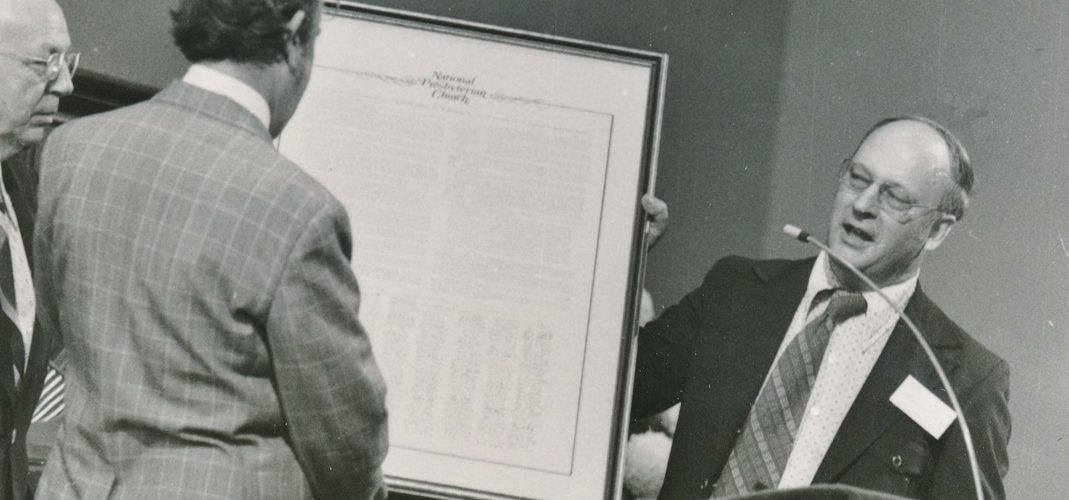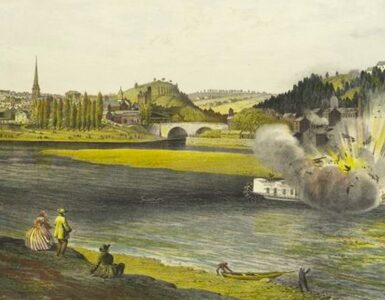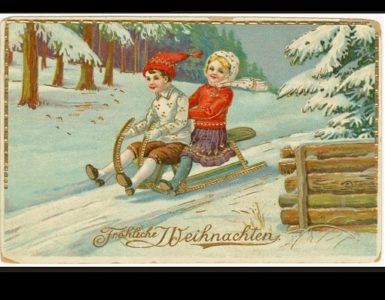The header photograph was taken during the second General Assembly of the Presbyterian Church in America (PCA) in 1974. It shows Stated Clerk Morton H. Smith at the podium as he presented a framed copy of the document “A Message to All the Churches of Jesus Christ” to the moderator of the first general assembly, Ruling Elder Jack Williamson. Dr. Smith was the PCA stated clerk for fifteen years ending in 1988 and moderator of the General Assembly in 2000. The poster-size document includes the signatures of 296 of the over 330 attendees of the first assembly meeting of the new denomination. It is not an official document but a symbolic remembrance of the forming of the PCA that was distributed by the J. Ligon Duncan family of Greenville, South Carolina. The man at the left edge is Teaching Elder Erskine L. Jackson.
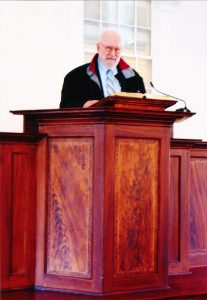 Dr. Smith’s recent relocation to the Lord’s presence provides the opportunity to consider the founding of the PCA. In the years since the fiftieth anniversary of D-Day in 1994 and Tom Brokaw’s book, The Greatest Generation, 1998, those who served and the many that died in World War 2 have been described as “The Greatest Generation.” Dr. Smith was a member of that generation as a trainer of Army Air Corps pilots, but more importantly for the Kingdom of God he was one of those who took a stand and left his denomination to form a new one concerned for the infallible Word, the Great Commission, historic Presbyterianism, and not only the peace of the church but also its purity.
Dr. Smith’s recent relocation to the Lord’s presence provides the opportunity to consider the founding of the PCA. In the years since the fiftieth anniversary of D-Day in 1994 and Tom Brokaw’s book, The Greatest Generation, 1998, those who served and the many that died in World War 2 have been described as “The Greatest Generation.” Dr. Smith was a member of that generation as a trainer of Army Air Corps pilots, but more importantly for the Kingdom of God he was one of those who took a stand and left his denomination to form a new one concerned for the infallible Word, the Great Commission, historic Presbyterianism, and not only the peace of the church but also its purity.
Dr. Smith and the founding fathers of the PCA should not be forgotten. It is currently historiographically, politically, and socially correct, even dogma, to consider leaders of the past anachronisms to be forgotten. It is disconcerting to see in the PCA a lack of appreciation for the men and women who suffered for the sake of faithfulness to the Word. There are many names that could be recounted for their having taken a stand in the early seventies but those that come to mind along with Dr. Smith include Robert Ostenson, James Baird, Robert Cannada, Paul Settle, Palmer Robertson, Gordon Reed, James E. Moore, Jim Bland, Herb Broadwater, and Frank Barker. These elders did not agree on everything but they were agreed that they needed to do something about their church situation and they suffered difficult times for their convictions. Dr. Smith’s passing should remind us of the difficult times forty-some years ago and the considerable debt that is owed to the PCA’s “Greatest Generation.”
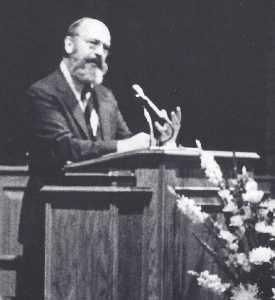 My acquaintances with Dr. Smith were limited to four or five brief times and auditing a class with him. Every time we conversed he was gracious and kind, and loved answering questions and making suggestions. Even though my meetings with him were few, I remember he had a wonderful sense of humor and in one case he cracked up in class laughing at himself because of a gaffe. I may be the only recipient of a PhD from Westminster Seminary whose external reader for my dissertation was Dr. Smith. I appreciated his comments greatly.
My acquaintances with Dr. Smith were limited to four or five brief times and auditing a class with him. Every time we conversed he was gracious and kind, and loved answering questions and making suggestions. Even though my meetings with him were few, I remember he had a wonderful sense of humor and in one case he cracked up in class laughing at himself because of a gaffe. I may be the only recipient of a PhD from Westminster Seminary whose external reader for my dissertation was Dr. Smith. I appreciated his comments greatly.
A wonderful way to remember Dr. Smith would be to thank those who founded the PCA, but it must be done soon because just as Brokaw’s generation is quickly passing away, so are those who were so important to the founding of the denomination. Sessions should make an effort to teach the younger generations in their congregations about the history of their church.
If you would like to read brief biographies of Dr. Smith the ones by Wayne Sparkman of the PCA Historical Center and the narrative by Joseph A. Pipa of Greenville Presbyterian Theological Seminary, which was founded by Dr. Smith, are both informative.
BY BARRY WAUGH
Notes—The photographs were provided courtesy of Director Wayne Sparkman of the PCA Historical Center. The document presented to Jack Williamson was reprinted with a few modifications by the Mel Duncan family and distributed at the General Assembly in Greenville in 2013.


